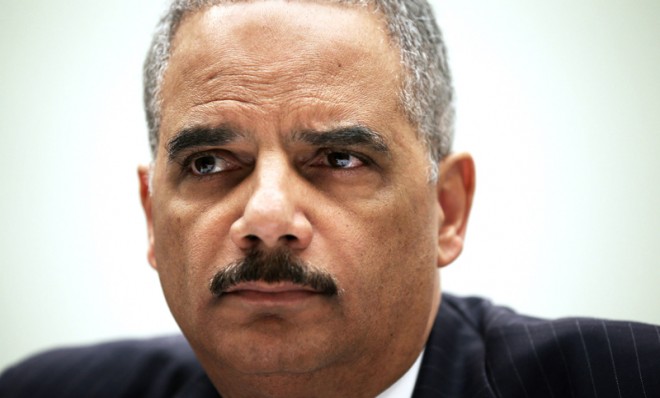Eric Holder's end run around the Supreme Court on voting rights
The battle over voter discrimination isn't over yet


A free daily email with the biggest news stories of the day – and the best features from TheWeek.com
You are now subscribed
Your newsletter sign-up was successful
One month after the Supreme Court struck down a central pillar of the Voting Rights Act, Attorney General Eric Holder announced Thursday that the Justice Department would seek a workaround to, in effect, keep part of that provision in place.
In a speech to the National Urban League in Philadelphia, Holder said the DOJ would ask a federal judge to require Texas to get the department's approval before making any changes to its voting guidelines for the next 10 years.
"This is the department's first action to protect voting rights following the Shelby County decision, but it will not be our last," Holder said. "Even as Congress considers updates to the Voting Rights Act in light of the court's ruling, we plan, in the meantime, to fully utilize the law's remaining sections to subject states to preclearance as necessary. My colleagues and I are determined to use every tool at our disposal to stand against such discrimination wherever it is found."
The Week
Escape your echo chamber. Get the facts behind the news, plus analysis from multiple perspectives.

Sign up for The Week's Free Newsletters
From our morning news briefing to a weekly Good News Newsletter, get the best of The Week delivered directly to your inbox.
From our morning news briefing to a weekly Good News Newsletter, get the best of The Week delivered directly to your inbox.
In a 5-4 ruling last month, the Supreme Court struck down Section 4 of the 1965 Voting Rights Act, which established a formula for determining which states and municipalities with a history of discriminatory voting laws had to receive "preclearance" from the DOJ before implementing any changes to their voting laws. The Justice Department used that power to block a couple of voter ID laws last year, including one in Texas, that critics said would suppress minority turnout.
The court's ruling left most of the law intact but, without Section 4's formula, largely toothless. Congress could pass an updated formula, though given the partisan gridlock that has smothered virtually all major legislation this year, it's safe to say the odds of such a bill passing any time soon seem are slim to none.
Holder's legal rationale is still being parsed. Here's Maddow Blog's Steve Benen:
What's the basis for this? We'll know more as the process unfolds, but it appears that the Justice Department believes that under the remaining provisions of the VRA, when "intentional voting discrimination" is found, these changes to voting rights cannot be permitted to continue. [MSNBC]
A free daily email with the biggest news stories of the day – and the best features from TheWeek.com
Jon Terbush is an associate editor at TheWeek.com covering politics, sports, and other things he finds interesting. He has previously written for Talking Points Memo, Raw Story, and Business Insider.
-
 Democrats push for ICE accountability
Democrats push for ICE accountabilityFeature U.S. citizens shot and violently detained by immigration agents testify at Capitol Hill hearing
-
 The price of sporting glory
The price of sporting gloryFeature The Milan-Cortina Winter Olympics kicked off this week. Will Italy regret playing host?
-
 Fulton County: A dress rehearsal for election theft?
Fulton County: A dress rehearsal for election theft?Feature Director of National Intelligence Tulsi Gabbard is Trump's de facto ‘voter fraud’ czar
